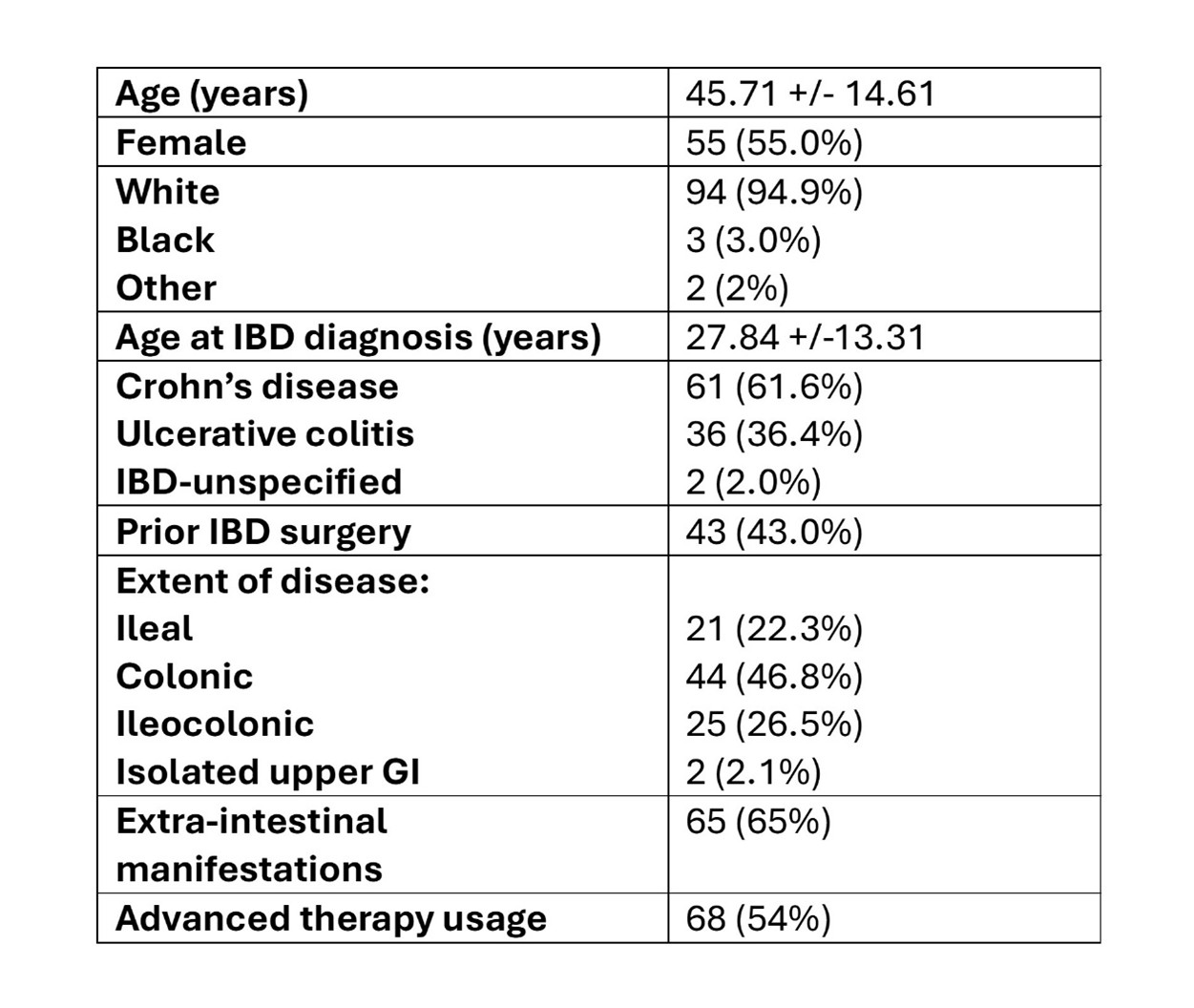Tuesday Poster Session
Category: IBD
P5435 - A Survey of Patient Experience, Preferences, and Perceived Barriers to Inflammatory Bowel Disease Care
Tuesday, October 28, 2025
10:30 AM - 4:00 PM PDT
Location: Exhibit Hall
- SS
Sargun Singh, MBBS
Case Western Reserve University School of Medicine
Cleveland, OH
Presenting Author(s)
Sargun Singh, MBBS1, Emily Steinhagen, MD2, Jeffry A.. Katz, MD2, Fabio Cominelli, MD, PhD2, Vu Nguyen, MD2
1Case Western Reserve University School of Medicine, Cleveland, OH; 2University Hospitals Cleveland Medical Center, Case Western Reserve University, Cleveland, OH
Introduction: Optimizing IBD care remains a challenge in the US. The purpose of this study is to examine patient’s experience, preferences, and perceived barriers to care.
Methods: Electronic surveys were emailed to 1832 IBD patients between the ages of 18 and 89 years. These patients were identified using keywords for IBD diagnoses and names of IBD providers in in the Electronic Medical Record Search Engine at a large academic medical center in Cleveland, OH from January to May 2025. A follow-up reminder for survey completion was sent at the 2-week mark. One-hundred completed responses were analyzed. The survey instrument included 28 mostly closed-ended questions about disease characteristics, experience, preferences, and potential barriers to care scored on a Likert-type scale and analyzed using descriptive statistics.
Results: Of the 100 respondents, majority were white (94.9%), female (55%), with the mean age at IBD-diagnosis being 27.8 years. Most had a diagnosis of Crohn’s (61.6%) (Table 1). 65% of patients reported having extraintestinal manifestations. The majority of patients were using advanced therapy.
The foremost barrier delaying IBD care was identified as issues related to health insurance (17.4%), followed by concerns about surgery and cost of therapy (Table 2a). Over 50% of patients considered access to infusion centers important to their IBD care followed by access to a dietician (Table 2b).
Discussion: From a survey of IBD patients at a single US tertiary IBD center, insurance issues and access to infusion centers are the most frequently cited barriers to optimized IBD care. Healthcare centers, industry, and government officials should collaborate to help facilitate access to affordable care and medications for IBD patients.

Figure: Table 1: Patient characteristics

Figure: Table 2a (left): Factors Resulting in Significant Delay in IBD Care
Table 2b (right): Patient Preferences: Important Clinical Services in IBD includes those who reported “important” to “very important” on a five-point scale.)
Disclosures:
Sargun Singh indicated no relevant financial relationships.
Emily Steinhagen indicated no relevant financial relationships.
Jeffry Katz indicated no relevant financial relationships.
Fabio Cominelli indicated no relevant financial relationships.
Vu Nguyen: AbbVie – Consultant, Speakers Bureau. Johnson & Johnson – Consultant, Speakers Bureau.
Sargun Singh, MBBS1, Emily Steinhagen, MD2, Jeffry A.. Katz, MD2, Fabio Cominelli, MD, PhD2, Vu Nguyen, MD2. P5435 - A Survey of Patient Experience, Preferences, and Perceived Barriers to Inflammatory Bowel Disease Care, ACG 2025 Annual Scientific Meeting Abstracts. Phoenix, AZ: American College of Gastroenterology.
1Case Western Reserve University School of Medicine, Cleveland, OH; 2University Hospitals Cleveland Medical Center, Case Western Reserve University, Cleveland, OH
Introduction: Optimizing IBD care remains a challenge in the US. The purpose of this study is to examine patient’s experience, preferences, and perceived barriers to care.
Methods: Electronic surveys were emailed to 1832 IBD patients between the ages of 18 and 89 years. These patients were identified using keywords for IBD diagnoses and names of IBD providers in in the Electronic Medical Record Search Engine at a large academic medical center in Cleveland, OH from January to May 2025. A follow-up reminder for survey completion was sent at the 2-week mark. One-hundred completed responses were analyzed. The survey instrument included 28 mostly closed-ended questions about disease characteristics, experience, preferences, and potential barriers to care scored on a Likert-type scale and analyzed using descriptive statistics.
Results: Of the 100 respondents, majority were white (94.9%), female (55%), with the mean age at IBD-diagnosis being 27.8 years. Most had a diagnosis of Crohn’s (61.6%) (Table 1). 65% of patients reported having extraintestinal manifestations. The majority of patients were using advanced therapy.
The foremost barrier delaying IBD care was identified as issues related to health insurance (17.4%), followed by concerns about surgery and cost of therapy (Table 2a). Over 50% of patients considered access to infusion centers important to their IBD care followed by access to a dietician (Table 2b).
Discussion: From a survey of IBD patients at a single US tertiary IBD center, insurance issues and access to infusion centers are the most frequently cited barriers to optimized IBD care. Healthcare centers, industry, and government officials should collaborate to help facilitate access to affordable care and medications for IBD patients.

Figure: Table 1: Patient characteristics

Figure: Table 2a (left): Factors Resulting in Significant Delay in IBD Care
Table 2b (right): Patient Preferences: Important Clinical Services in IBD includes those who reported “important” to “very important” on a five-point scale.)
Disclosures:
Sargun Singh indicated no relevant financial relationships.
Emily Steinhagen indicated no relevant financial relationships.
Jeffry Katz indicated no relevant financial relationships.
Fabio Cominelli indicated no relevant financial relationships.
Vu Nguyen: AbbVie – Consultant, Speakers Bureau. Johnson & Johnson – Consultant, Speakers Bureau.
Sargun Singh, MBBS1, Emily Steinhagen, MD2, Jeffry A.. Katz, MD2, Fabio Cominelli, MD, PhD2, Vu Nguyen, MD2. P5435 - A Survey of Patient Experience, Preferences, and Perceived Barriers to Inflammatory Bowel Disease Care, ACG 2025 Annual Scientific Meeting Abstracts. Phoenix, AZ: American College of Gastroenterology.
